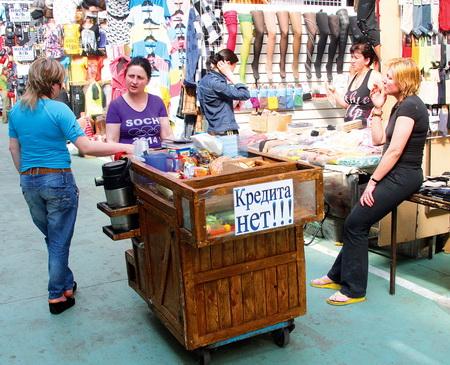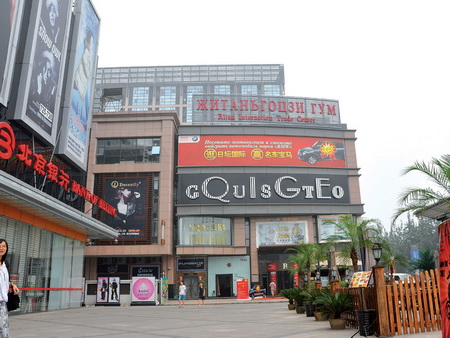| Can-do Russians work around trade problems | |||||
http://english.dbw.cn銆€銆€
2009-07-31 14:47:07
|
|||||
|
BEIJING, July 30 -- Outside, 36 degrees Celsius. Humid, stagnant air, melting asphalt and sweaty people mix and match aromas on Yabao Road market in east Beijing. Inside, a fresh light breeze and a light leather fragrance tempts an exotic array of colorful customers to linger, perhaps splash some cash from their bulging clutch pleather purses. A 32-year-old Muscovite, one of hundreds of Russian leather merchants, greets old customers on the street and introduces the latest fur shoes in his shop at the biggest shopping mall in the street. His 15-square-meter pearl-curtained, air-conditioned, jewel-and-mirror emporium displays leather shoes, coats and wallets of exquisite workmanship but prohibitive prices. Taking advantage of cheap Chinese labor, the trader, who asked not to be named, opened his own leather business six years ago. Different from other Russian businessmen who shuttle back and forth between Russia and China trading light industrial products, he produces leather products in his own China-based factories and sells them in his own shops. Running three factories and hiring more than 1,200 workers in his factory in southern China's Guangdong Province, the trader does not mind admitting he has profited greatly in the last few years, but confessed business has been hit by the financial crisis. Earnings are 65 percent down on the same period two years ago. "We had more customers two years ago when my business was not that large," he told the Global Times.
"But still the profits we get now are enough for me and my employees to make a living." Despite the global dip in profits, he remains optimistic about the market and is surprised by China's rapid progress. "The Chinese government is fair about enforcement," he said. "They are not biased toward the rich." The market will bottom out soon, he believes. "Three years ago, Chinese people were afraid of getting in touch with foreigners. They used to be cautious and prudent in communicating with us," he said. "Lots of them were afraid of me. They avoided talking and having direct eye contact with me. At the same time, they were interested in me and they took photos in secret. And it's improving now." Although satisfied with his China experience, he suggested the Chinese government should make the purchase of imported cars more accessible while nonetheless maintaining social stability. "If I bought a Lamborghini in China, the prices I pay would be around 180 percent higher than the prices in Russia, so I'm still not rich enough to purchase a car like a Lamborghini in China. "Sometimes [Chinese] policies are too tight for us to run business while other times they are too loose, which is understandable." He boasted the Russian authorities' policies are better than China's, but sometimes they too could disappoint. Just ask Li Jinyuan. About 6,400 kilometers from Yabao Road, Chinese businesswoman Li Jinyuan is still worrying about her Moscow business and her future. The Russian government shut down Europe's largest market on June 29. The sprawling Cherkizovsky market sold smuggled products, employing tens of thousands of Chinese merchants: reportedly $2 billion merchandise has been destroyed by the government, despite an official pledge to release seized goods by September. Li got most of her seized goods back after several rounds of negotiations between China and Russia over the issue. But she could not escape paying a large "deposit" to buy back the goods she had once kept on her own shelves. "I'm thinking about registering a company in Moscow," she said, "as I fear another crackdown in the future. I'd also like to see a Chinese-funded market in Moscow some day so that we can do our business in it without fear." With the world financial crisis, Russian-China bilateral trade volume has slid 39.2 percent compared with the same period last year, showing negative growth for the first time in ten years, according to Gao Hucheng, vice minister of commerce. Still hundreds of Russian traders are preparing to snap up low-price goods and haul them away back to Russia. The 45-year-old trader Boris Andreevich, who declined to give his full name, doesn't own his own shop in China. He comes to China twice a year and takes leather products back to Moscow. He told the Global Times his business suffered great losses recently. "It's not because of the financial crisis. The Russian government is the one to be blamed," he said. "They closed the Cherkizovsky market and we have no place to sell our imported goods. "Many Russian businessmen lost their jobs because of that. So this time I had to cancel lots of orders." An annoyed Boris slammed the door of his van and drove away. Forty-year-old Moscow businesswoman Larisa Sergeevna E, who did not give her full name, trades products between Russia and China and operates a small shop in Beijing, takes a similar view. "Business is harder than ever," she said. "The Russian government is responsible for that. Some officials hold different views with Putin. The disputes lead to the shutdown of the market, so our business is bogged down." Not all the Russians at Yabao Road are hurting. "Our business has continued very well, pretty normal," Yuri Lobanov Evatekinbova said. "I don't feel the effects of the financial crisis or the shutdown of the market in Moscow." Evatekinbova told the Global Times the reason he came to China was because Chinese products are cheaper than in other countries. With broad consensus on the proper handling of the closure of the market reached by both Russia and China according to the Xinhua News Agency, joint efforts will be made in future to ensure sound development of bilateral trade. While for Chinese businesswoman Li, her past experience of doing business in Russia made her too recalcitrant to give up her career halfway. "I will not stop my adventure here," Li said. "I even almost got killed in 1995. I will not let my 17-year effort be in vain." |
|||||
| Author锛? 銆€銆€銆€Source锛? xinhua 銆€銆€銆€ Editor锛? Yang Fan | |||||
 涓枃绠€浣?/a>銆€|銆€
涓枃绠€浣?/a>銆€|銆€












